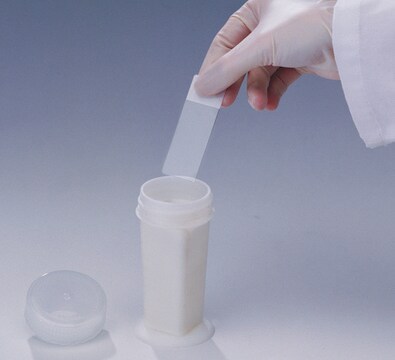OP80
Anti-APC (Ab-7) Mouse mAb (CC-1)
Sinónimos:
Anti-Adenomatus Polyposis Coli
About This Item
Productos recomendados
biological source
mouse
Quality Level
clone
CC-1, monoclonal
form
liquid
contains
≤0.1% sodium azide
species reactivity
human, mouse, rat
manufacturer/tradename
Calbiochem®
storage condition
do not freeze
technique(s)
immunocytochemistry: suitable
immunofluorescence: suitable
immunohistochemistry (frozen sections): suitable
dilution
(Free-floating SectionsParaffin Sections)
isotype
IgG2b
shipped in
wet ice
storage temp.
2-8°C
General description
- Antibody Target Gene Symbol: APC
- Target Synonym: AI047805, Apc7, AU020952, AW124434, BTPS2, DP2, DP2.5, DP3, Familial adenomatous polyposis, FAP, GS, Min, RATAPC
- Entrez Gene Name: adenomatous polyposis coli
- Hu Entrez ID: 324 (Related Antibodies: ST1150, OP62, OP47L, OP44)
- Mu Entrez ID: 11789
- RatEntrez ID: 24205
Immunogen
Application
Well suited for IHC and IF studies of oligodendrocytes and optic nerves due to the antibody′s staining of the cell body as opposed to the myelinated processes. Both frozen sections and formalin-fixed, paraffin-embedded brain sections can be used. Antibody should be titrated for optimal results in individual systems.
Packaging
Warning
Physical form
Analysis Note
Positive control: Purkinje cells or cerebellum tissue
Legal Information
Storage Class
12 - Non Combustible Liquids
wgk_germany
WGK 2
flash_point_f
Not applicable
flash_point_c
Not applicable
Certificados de análisis (COA)
Busque Certificados de análisis (COA) introduciendo el número de lote del producto. Los números de lote se encuentran en la etiqueta del producto después de las palabras «Lot» o «Batch»
¿Ya tiene este producto?
Encuentre la documentación para los productos que ha comprado recientemente en la Biblioteca de documentos.
Nuestro equipo de científicos tiene experiencia en todas las áreas de investigación: Ciencias de la vida, Ciencia de los materiales, Síntesis química, Cromatografía, Analítica y muchas otras.
Póngase en contacto con el Servicio técnico








